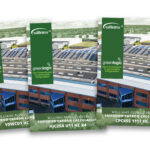Stephen Bickmore, UK commercial manager for the plant-based food division at Vandemoortele, explains how the process of refining crude palm oil creates a consistent quality frying medium and how operators should look after it
How is the fats and oils market looking now?
It is fair to say that the raw material prices have settled down, but refining costs are still high, prices are moving upwards now, but the future is difficult to determine because of the unrest in the world. That is the biggest contributor to the general feeling in the oil and fats market. But in regard to palm oil, which is what Vandemoortele predominantly deals with, I can confidently say we don’t have a supply issue at the moment.
Tell us a little about Vandemoortele and P100
Vandemoortele is a Belgian company – it is celebrating 125 years this year – and is one of the largest fats and oils producers in Europe. But it does not just produce margarine and fats, Vandemoortele is a baker too, producing items such as bread, pastry, doughnuts, and muffins so it must concentrate on quality, and that is an ethos that filters through to P100, which Vandemoortele has been producing for 70 years now. P100 is a highly refined, premium palm oil produced in a separate factory and country from our margarine manufacturing site.
Why is it important to produce P100 in a dedicated factory?
Because we are also a margarine producer, we have various lines that feed the different production lines and, even though we have good controls in place, we want to be 100% certain that there is no contamination because we are producing a superior product. So, for example, in the German factory where P100 is made, there is not a water phase so there is no chance of any contamination from water.
Also, on the same site as the P100 factory is the Cargill refinery – one of the largest oil refiners in the world – so all the palm oil we buy comes through the Cargill refinery and directly across the lines into our packing hall. Again, it means the quality and integrity of the product can be maintained. By having P100 produced in that factory, we know we can keep the quality high.


What makes P100 different to other palm oils?
Quite simply, it is the purity of P100. It is highly refined, therefore, we are taking out the impurities to a high level and it is those impurities that cause fats to degrade faster. It is important to remember that P100 starts as crude palm oil and, being a natural product, the specification is very wide. You can either refine it less, and therefore you have a product which might vary, or you refine it to a high degree and get consistency. That is the decision we made, and it costs more to refine to that level, but that is where we really believe the quality of the product is, it is in the refining process. So, batch on batch, whenever an operator gets a box of P100, it should look the same, feel the same, and perform the same. It is one of the reasons why it is not always the cheapest palm oil on the market, but we believe it is the best.
When did P100 become RSPO-certified?
In 2009 Vandemoortele became a member of the RSPO (Roundtable on Sustainable Palm Oil) and P100 was declared certified sustainable palm oil. This means it has been farmed, processed, and distributed according to stringent RSPO principles and criteria. Two years ago, we went a step further and declared P100 fully segregated, which means the palm oil has been kept separate from non-sustainable palm oil throughout the supply chain. What that means for the end user is that they can be confident that P100 is 100% RSPO sustainable palm oil, it is not mixed with anything unsustainable, and this is marked on our boxes by the term “P100 SG”.
Is there a greater spotlight on sustainability in the fats and oils market now?
Yes, absolutely although the foodservice industry has been a lot slower to switch across to sustainable fats and oils than retail, I think mainly because the end user is not buying something with a stamp on it. But it is on people’s minds more now, and they want to see that in the products they are buying. All the main UK and European refiners refine sustainable palm oil because there is more of it around now, so it is getting to the stage where all the major suppliers are using the segregated route now anyway.
What advice would you give to friers to manage their oil?
The most obvious is filtering the oil to remove any of the impurities that will burn and cause the oil to deteriorate, and the second is not to overheat the oil because a superior quality oil does not need to be overheated. We have put together a guide detailing the ideal frying temperatures for friers to reference. And we have tried to make it easier for friers to keep their fat fresh by having such a pure product so that it will last longer. But it is up to the frier to look after it. If they overheat it and burn it, then obviously it is not going to be as effective.
Finally, you have a big marketing campaign running, so why have you chosen now to engage with customers?
In today’s industry, everyone is trying to save money because of the cost-of-living crisis. I know when I have spoken to fish and chip shops they are really struggling with the costs of heating and lighting, labour and raw materials. So, it was important for P100 to get the message across that buying the cheapest oil may not necessarily be the most cost-effective decision for the business. Instead, spending a little bit more on premium quality oil will save you money in the long term because it will last that much longer. And, more importantly, it keeps the quality of your product – you do not want customers tasting the oil, you want customers to taste the product.
TOP TIPS
Ensure clean, fresh, and tasty food from the first portion to the last with P100
• Solid fats should be melted gently to start
• The frying temperature of the oil should be between 175°C and 180°C.
• Ensure food is as moisture free as possible
• Frying ratio is one part food to six parts oil
• Keep oil topped up and filter each day
• Cool and cover ranges when not in use










